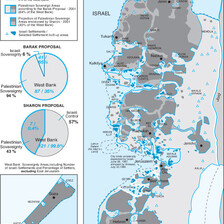The Electronic Intifada 22 December 2002
Why do false assertions about the circumstances of Israel’s November killing of UN official Iain Hook in Jenin continue to make it into NPR news bulletins even after they have been fully exposed? Hugh Sansom, an avid NPR listener, shared this letter with EI.
Dear NPR,
Following NPR’s 8 AM summary on 21 December of the United States’ veto of a UN resolution condemning Israel for its killing of three UN workers in recent weeks, reporter Nora Raum specifically referred to the killing of a British UN worker in November.
It is interesting that NPR didn’t name him — Iain Hook. We might wonder whether NPR joins the Israeli government in seeking to dehumanize every victim of Israeli violence, Palestinian or not.
More important: NPR asserted that the UN worker, Iain Hook, was killed during “a gun battle between Israeli soldiers and Palestinians.” This is FALSE. Even the Israeli army has retreated from this lie. Indeed, they withdrew it within days after the UN termed Israel’s account “totally incredible.” [1, 2, 6, 7]
It is true that there was fighting in Jenin after the Israeli army invaded the refugee camp, ostensibly looking for a specific, alleged terrorist (Abdullah Naji Wahash) [4]. And Hook had earlier been caught between a Palestinian fighter and Israeli forces. He emerged unharmed at that time.
Is NPR hiding behind an ambiguity to serve the propaganda interests of Israeli colonial forces?
At the time and place of Hook’s murder, there was no fighting. The UN has repeatedly reported that “there were no militants on the site.” [5]
In fact, the Israeli soldier was a sniper, with a telescopic sight, just 25 meters from Hook — 25 meters away. Hook [may have been] shot in the back. And, according to London’s Guardian newspaper [6], “soldiers prevented an ambulance reaching the compound for 25 minutes” — although the IDF had already been told that Hook had been shot. Iain Hook bled to death. He might have lived but for another instance in the well-documented Israeli practice of interfering with medical personnel.
Further undermining Israel’s lies about a “battle”, eyewitnesses and investigators have reported a total absence of evidence of a battle at the site of Hook’s killing. There had been no gunfire around the site for at least twenty minutes leading up to the IDF sniper attack. And Hook was the only person shot at the time. There was no surrounding damage from ammunition. [6] Some report Israeli soldiers hurling obscenities and threats [2, 3] at UN workers (fitting a documented pattern of IDF threats against UN and international workers [8, 9, 10]).
In short, the IDF sniper targeted Hook and murdered him.
As far as I know, NPR reported none of the above details when they emerged. And now NPR repeats a proven falsehood.
Why?
Sincerely,
Hugh Sansom
Brooklyn, NY
[1] Three UNRWA press releases address Hook’s killing. The most recent responds to IDF assertions that Palestinian gunmen were in the UN compound;
Another terms the IDF account “totally incredible;”
The earliest simply reports the killing of Hook
[2] Democracy Now offers a Real Media clip of an on-air interview with Caoimhe Butterly. Democracy Now introduces the story with a reference to the altered Israeli account.
[3] The Guardian relays the firsthand account by Irish activist Caoimhe Butterly who was shot on the same day as and in the vicinity of the attack on Iain Hook. It was Butterly who quoted an IDF soldier shouting through a bullhorn: “We don’t care if you are the United Nations or who you are. Fuck off and go home!”
[4] IDF press release, 23 November 2002. The IDF claims shots were coming from the UN compound (and they claim they brought in an ambulance); �
The Israeli Foreign Ministry’s version of the same
[5] An UNRWA press release states: “At no time did any guns or gunmen enter the UN compound.”
[7] Eric Silver reports in Britain’s Independent newspaper on the UN rejection of the Israeli account.
[8] Human Rights Watch call for Israeli forces to stop attacking medical personnel. March, 2002




